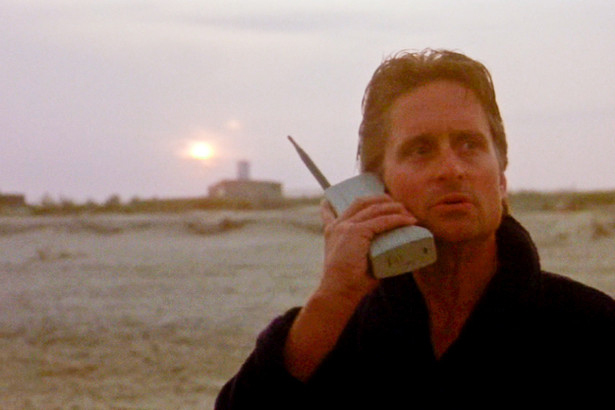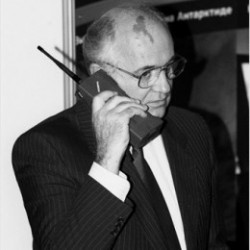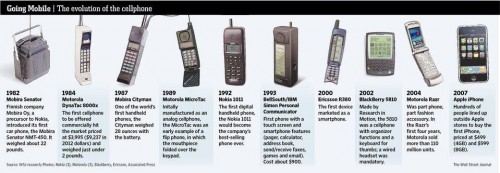
When did mobile phones go from being symbols of status and power to being “emasculating”? Probably around the time they became easier to access than toilets are.
Sergey Brin, of course, would likely say that emasculation arrived with the touchscreen smartphone—when using a mobile phone became a matter of “standing around and just rubbing this featureless piece of glass” while looking down, instead of flexing one’s bicep to bark orders into a massive handset while staring straight ahead (or glaring at a subordinate). Real men don’t “stand around”; real men do stuff! Real men punch buttons with authority, and take decisive action! PJ Rey (@pjrey) and I may have argued that we express agency through our smartphones, but “rubbing”? Touching? That’s, like, girl stuff. Eeeeeeew.
Tongue-in-cheek riff aside, there’s more to Brin’s smartphone insecurity than may be apparent on the (glassy) surface. Brin sees his smartphone as “emasculating” not just because he has to stand still and touch it, and not just because “even girls” could use it, but also because his smartphone no longer signifies him as a member of the power elite. Conceptualizations of masculinity are inextricable from conceptualizations of power, and Brin’s privileged status comes to him from social class and professional identity as much as from gender. Cell phones were symbols of masculine power when only wealthy businessmen had them, but now that literally billions of people own them, the cell phone’s ability to signify status has given three beeps and vanished like a dropped call.
Think back (if you’re old enough) to when very few people had cell phones, back when they were huge and expensive. When you picture someone using one of those cumbersome early cell phones, whom do you picture? Is it a white guy in a suit, maybe wearing a Rolex and 1980s sunglasses? Yeah, I thought so. When they first came out, cell phones—like pretty much every brand new, expensive technology—were status markers. A cell phone said, “I am wealthy, I am powerful, and I am so important that people must be able to reach me even when I am away from my home or office.”
Cell phones got smaller of course, and less expensive, and more common. Elites were saved, however, by the arrival of the touchscreen smartphone. Though not as pricey as the first cellular phones, the first iPhones were still expensive and hard to get; even with a $499 price point and a mandatory two-year contract with AT&T, people stood in line at Apple stores for hours to get their hands on one. The iPhone became an instant status symbol in 2007—but fast-forward to 2013, and what now? There’s roughly a zillion different touchscreen smartphone models on the market. The iPhone itself is available on all four major US carriers (without unlocking); from three feet away, a brand new $849 iPhone 5 is pretty much indistinguishable from a used $90 iPhone 4. Once an exciting status symbol, even the touchscreen smartphone has become plebeian and mundane.

Here’s a thing that happens: elites (and people in general) like status symbols, but when status symbols become too easy to obtain and thus lose their status-signifying power, elites begin to dislike those things—and to look for new status symbols to replace them. The indie music joke is that “nothing is any good if other people like it”; the Status Symbol Corollary is that nothing is any good if (the wrong kinds of) other people have it. Take Facebook, for example: When you had to be at an elite school to join Facebook, a Facebook profile was a status symbol; once the proles (and their mothers!) joined Facebook, not being on Facebook became the status marker. Before Facebook, it was MySpace: as danah boyd (@zephoria) has shown [pdf], white middle- and upper-class kids left in droves once their working class and non-white peers had a significant presence on MySpace. I’ve argued that something similar started to happen with Twitter, too, when the early adopter elite clamored to fork over $50 to join App.net. And now, something similar is set to happen with smartphones: Google Glass is the new iPhone.
I thought about titling this post, “Google Glass: The Beginning of White Flight from Smartphones,” but instead I’m going to propose a new term, status flight, to describe what happens when elites abandon a status symbol that’s lost its signifying power after becoming too quotidian and ubiquitous. This isn’t to say there aren’t some real “white flight”-type elements here; accessing the Internet via mobile phone is more common for Black and Latina/o users than for white users, for instance, and it’s no coincidence that the first Glass-related Tumblr I saw was White Men Wearing Google Glass. (There’s now a Black Men Wearing Google Glass Tumblr too, though as I write this, it features only one picture of one man; White Men Wearing Google Glass presently has 27 pictures, though Sergey Brin appears more than once.) At the same time, I worry about extending boyd’s “white flight” metaphor too far; I also want to capture the simultaneous race, gender, and class dynamics that feed into this phenomenon. While class dynamics are a part of what boyd describes in her paper, this seemed to be lost on some readers of my App.net piece—so though I’m ambivalent about using a new term, I thought I’d test this one out. Status flight therefore describes when people of higher status (in this case, privileged white technophile men) dissociate themselves from something that has become too closely associated with people of lower status (in this case, pretty much everyone else).

There are plenty of people out there, I’m sure, who will see the digirati’s enthusiasm for Google Glass as plain old Brand New Gadget Fetishization, nothing more. But technology isn’t neutral, and neither is its fetishization; Google Glass is no exception. One of the first issues raised in response to Google Glass was (unsurprisingly) that of privacy, for users and non-users alike—and it’s the privacy risks to people other than the Glass user that are particularly telling. It’s even harder to tell if someone is taking a picture of you with Google Glass, for instance, than it is to tell if someone is taking a picture of you with a smartphone; Google Glass also has “the ability to record video of the people, places, and events around you, at all times.” While some have argued that this push further toward a surveillance state will actually be empowering, the facts are that increased visibility can be disempowering for marginalized groups, especially when that visibility is on dominant groups’ terms. As I’ve explained before, this is something Google consistently fails to understand.
That Brin has gendered Glass as “male” is neither a surprise nor a coincidence. Consider that interest in Google Glass is overwhelmingly (though not exclusively) from men; consider that the victims of “creepshots” or “revenge porn” are overwhelmingly (though not exclusively) women. Consider the expanded affordances for surreptitious documentation that Google Glass provides. Now (re)consider Google Glass as the device that restores the smartphone user’s diminished masculine power…and just sit with that for a minute. Whether it’s the medical gaze, the masculine gaze, or the panoptic gaze, the gaze is synonymous with power—and he who has Google Glass need never look away.
Obviously there are and will be women Glass users, and obviously lots of men will own Glass without using the device to do anything degrading to women; I should hope all of that would go without saying. But while I’ve been trying to avoid using “creepy” as shorthand for “technology + power + WTF,” I’m sorry: When Brin says smartphones are “emasculating,” and that Google Glass is the answer, the gendered dimensions of status flight to Google Glass do strike me as seriously and significantly creepy.
EDIT (4 May 2013): I need to clarify here that I am introducing “status flight” as a new term, not as a new concept; it is hardly a new concept! A large number of sociologists, cultural theorists, & others have done important work in this area, and my intention is certainly not to overwrite or to supplant any of that (or to claim that work as my own). Rather, my goal here is to see if and how using a new term to talk about these issues might affect the conversations that follow.
(16 May 2013): I removed a link from the body of this post after several people alerted me to the fact that the site hosting the essay I’d linked also featured highly objectionable content. Since a link is arguably promotion, I do not want to promote the views the rest of that site was expressing.
Whitney Erin Boesel (@phenatypical) tweets regularly from her touchscreen smartphone, but it doesn’t make her feel like any less of a man.
“Wall Street” still from here; cell phone timeline image from here; Gorbachev on phone from here; Brad Pitt phone image from here.


Comments 38
Elly/QRG — May 3, 2013
'Conceptualizations of masculinity are inextricable from conceptualizations of power, and Brin’s privileged status comes to him from social class and professional identity as much as from gender. '
- I disagree. I write about masculinity all the time without feeling an urge to go on about power. Because I don't think men as a whole group have 'power' in society over women as a whole group. This is because I do not accept the gender binary of 'men' v 'women' as a binary. I thought you didn't either?
Status Flight and the Gendering of Google Glass » Cyborgology | Pearl of Civilization — May 4, 2013
[...] http://thesocietypages.org/cyborgology/2013/05/03/status-flight-and-the-gendering-of-google-glass/ [...]
Thomas — May 4, 2013
I 100% disagree with this article.
Also, people have taken Brins words the wrong way. Basically for me personally and I know for other people too, to avoid awkward situations we often times look at are cell phones and do nothing on them instead of facing the situation we are in.
If you look at the mariam-webster dictionary, the number one definition of emasculation is " to deprive of strength, vigor, or spirit" ...doesn't say of a man or a women. The word doesn't apply to a specific sex
Nick Carr — May 4, 2013
Whitney,
I find it very hard to believe that Brin, who was an immigrant child in the 80s and a student in the 90s, ever conceptualized of a mobile phone as a signifier of the masculine "power elite." The time frame doesn't fit - the device was a common, mass market good by the time he became aware of it. Whatever Brin may be, an 80s bond trader he ain't. (It's also worth noting that his company, via the Android operating system, played a central role in democratizing the smartphone and hence destroying its role as a status signifier.) In gendering a smartphone as a female (the "emasculator," in gender stereotypes, is a female, not a male) Brin actually kind of subverted the traditional conceptualization of the gadget, didn't he?
Also, regarding the concept of "status flight," I think Georg Simmel, et al., got there before you.
Mark — May 4, 2013
What was especially insightful about Boyd's flight metaphor was that it extended the spatial way we conceptualize networks, and showed how race and class played out in parallel problematic ways in both "places".
How does concept of "status flight" lead us anywhere new? It is surely true that smartphones are now much weaker talismans of status, just as MacBooks are less effective status symbols now that they are ubiquitous in coffee houses frequented by college students of no particular means or prospects. But the idea that scarcity is a core component of status value is not exactly novel. Veblen's Theory of the Leisure Class was published in 1899.
Also, other than Brin's offhanded "emasculation" comment is there any reason to believe that the types of early adopters interested in Glass are actually going to stop valorizing high end smartphones both for their affordances and ability to connote status through design, size, etc? It is hardly the case that purchasing expensive new earrings causes someone to stop wearing their designer jeans. Anyway, at the end of the day, Glass pairs with, and depends upon a smartphone, so, regardless of their wishes, no one will be fleeing far.
Viewing Glass as a metaphorical extension of the male gaze seem a more promising line of inquiry. While I doubt that staring at someone with a glowing eye will actually be less obvious than recording with a smartphone (we'll see in the next few months) its actual capabilities are irrelevant to an analysis of of people's responses at a time when they don't have access to the device. In the absence of facts creeps may hope, just as others may fear.
Susan Laddon — May 4, 2013
Whitney, I do not profess to know who Nick Carr is, but I agree with him, on the face of his argument. S. Brin is 40 years old, (yes, I did my due diligence on him, and you.) therefore Brin grew up in Communist Russia. To postulate that he grew up in an atmosphere of certain gender stereotypes might explain his commentary, I don't know, Nick Carr said it better. I will say one thing unequivocally, you have your facts wrong, simply because you were not there, you weren't alive when the first cell phones came out, I WAS, and my cousin (FEMALE) was the Assistant Vice President of some business company, she has a MBA from University of Tampa 1978, and she used to carry around that bulky cell phone pictured as being released/offered for sale in 1982, the VERY FIRST MOBILE PHONE(S) in existence. therefore, in my layman's opinion, your article/argument is not proven prima facie.
Are you in the habit of presenting your PhD papers/research for publication without thorough review from your dissertation committee? I specifically question the wisdom of that, but I am not a Sociology major in my 20's.
Mark — May 4, 2013
I think you are right, some early adopters will value Glass only as a symbol of their status and privilege, others will just geek out on it's capabilities, while being oblivious to it's cache (or dorkiness). Yet others (and I will fall into this category) mostly want to play with an unevenly distributed bit of the future, but are happy to take whatever status comes along for the ride.
This discussion reminded me of the $1000 diamond app that was around when the iTunes app store first launched. 7 people bought an app whose only function was to demonstrate that one could throw away $1,000. Eventually Apple banned the thing, presumably embarrassed by the nakedness of the transaction.
I hope I'm right the difficulty of using Glass to accomplish invasive things beyond what can be accomplished today with smartphones. (which, unfortunately is not setting the bar very high) If not, I hope Google makes changes based on feedback from the explorer program.
Barry Wellman — May 4, 2013
Whitney Erin, With all due respect, My memory is that mobile phones quickly got adopted by tradespeople who drive vans -- small business owners or employees therefore -- who travel between jobs as plumbers, electricians, etc. Masculine, sure (I'm guessing 90%+ are men) but not elite.
In Their Words » Cyborgology — May 5, 2013
[...] “the cell phone’s ability to signify status has given three beeps and vanished like a dropped call” [...]
Warren Ellis » Bookmarks for 2013-05-05 — May 5, 2013
[...] Status Flight and the Gendering of Google Glass » Cyborgology"I thought about titling this post, “Google Glass: The Beginning of White Flight from Smartphones,” but instead I’m going to propose a new term, status flight, to describe what happens when elites abandon a status symbol that’s lost its signifying power after becoming too quotidian and ubiquitous."(tags:culture social phones comms ) [...]
Hidden Secrets of Google Glass Hint At AR Future — May 10, 2013
[...] Glass, will it be the next Segway, is it just a sign of "status flight"? Will everyone who wears it look [...]
Are Smart Phones Emasculating? The Marketing of Google Glass » Sociological Images — May 22, 2013
[...] Whitney Erin Boesel, writing for Cyborgology, applies this process to cell phones, or what are better described as “mobile devices.” [...]
NancyP — May 22, 2013
Mention "early mobile phone user" and I think "large-animal veterinarian". Large-animal vets travel to their patients and are in their trucks a lot.
A certain type of man has to show off that he has the most current gadgets. This doesn't necessarily mean that one particular man in the trendy early adopter group is particularly powerful. After all, at least one Republican presidential candidate (McCain?) admitted to being unfamiliar with using "the internet" and sending emails. One sign of power is having a secretary to do every possible chore, however unnecessary.
Lars — June 6, 2013
Hi Whitney - I appreciate your article and analysis! Thank you so much for posting. This is consistent with what I've seen and it's very affirming to see it so well-articulated.
Google Glass: a sociological perspective | This Sociological Life — August 5, 2013
[...] It has been speculated that as Glass becomes more commonly used, the ultimate surveillance society will result. Users will become both observed and observers: they will monitor others at the same time as they themselves are being surveilled (Joe Brodie). Many commentators have noted that constant surveillance of people by others around them will result in multitudes of data about individuals being stored in the cloud that may potentially be accessed by government or other agencies (Jason Perlow), a particular concern in the light of the recent American government’s PRISM surveillance scandal. It has been also asserted that Glass may be used to further stigmatise and marginalise minority groups by contributing to the surveillance technologies that are already disproportionately directed towards them and to the humiliation and stalking of women via such digital recording strategies as ‘creepshots’ and ‘revenge porn’ (Whitney Erin Boesel). [...]
Google Glass Reborn as Something You’d Actually Want to Wear - Breaking News, Latest News and Current News from 7u8.net. Breaking news and video. Latest Current News: U.S., World, Entertainment, Health — August 19, 2013
[...] her doctorate in sociology at the University of California, Santa Cruz. Boesel has written that Google Glass serves as a status marker, one eagerly awaited by well-to-do digerati whose iPhones have become [...]
Google Glass Reborn as Something You’d Actually Want to Wear - Tumblrnews — August 19, 2013
[...] her doctorate in sociology at the University of California, Santa Cruz. Boesel has written that Google Glass serves as a status marker, one eagerly awaited by well-to-do digerati whose iPhones have become [...]
Google Glass Reborn as Something You’d Actually Want to Wear - BMAgads.com — August 19, 2013
[...] her doctorate in sociology at the University of California, Santa Cruz. Boesel has written that Google Glass serves as a status marker, one eagerly awaited by well-to-do digerati whose iPhones have become [...]
Google Glass Reborn as Something You’d Actually Want to Wear | DailyReaders – Readers Maniacs — August 19, 2013
[...] her doctorate in sociology at the University of California, Santa Cruz. Boesel has written that Google Glass serves as a status marker, one eagerly awaited by well-to-do digerati whose iPhones have become [...]
Google Glass reborn as something you’d actually want to wear - Tumblrnews — August 20, 2013
[...] doctorate in sociology at the University of California, Santa Cruz. Boesel has written that Google Glass serves as a status marker, one eagerly awaited by well-to-do digerati whose iPhones have become [...]
Google Glass reborn as something you’d actually want to wear | Web Design Basic — August 20, 2013
[...] her doctorate in sociology during a University of California, Santa Cruz. Boesel has created that Google Glass serves as a standing marker, one energetically awaited by well-to-do digerati whose iPhones have turn [...]
Are Smartphones Emasculating? The Marketing of Google Glass — September 20, 2013
[...] Whitney Erin Boesel, writing for Cyborgology, applies this process to cell phones, or what are better described as “mobile devices.” It [...]
Cyborgology Turns Three » Cyborgology — October 26, 2013
[…] 6. Status Flight and the Gendering of Google Glass […]